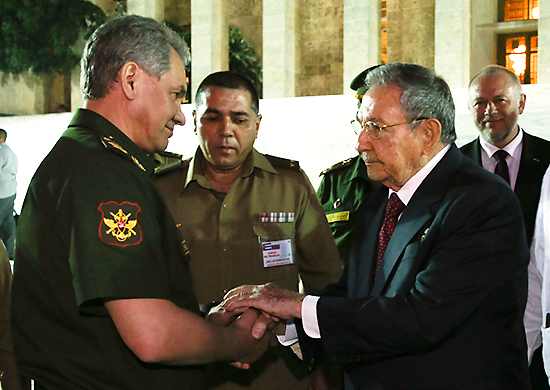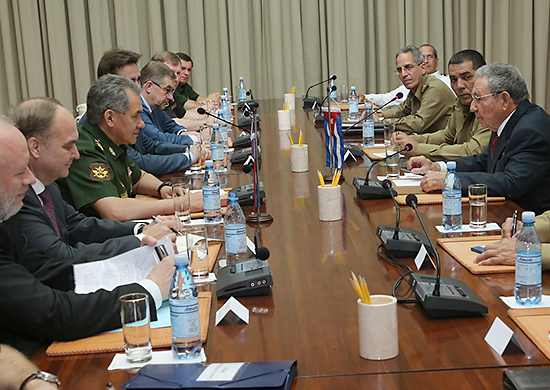
Shoigu’s mission was successful, military observers say
Russian Defense Minister Sergei K. Shoigu is scheduled to return to Moscow from Havana today (Feb. 14) and the consensus from Russian military experts is that his trip was practically and symbolically successful.
Interviewed by the Russian news agency Tass, the chief editor of the Defense Ministry’s journal “National Defense,” Igor Yurevich Korotchenko said that the three countries visited by Shoigu — Venezuela, Nicaragua and Cuba — “have been our traditional partners in Latin America, so it behooves us to maintain and develop relations with them.
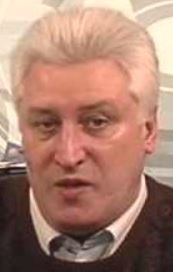
“From a practical point of view, it is clear that Russia will expand its military presence and combat missions in the western hemisphere,” he said, “so one of the agreements was to simplify the procedures for the arrivals of Russian ships” at ports in the three countries.
Indeed, agreements were reached in all three capitals for the expeditious welcome and resupply of Russian ships on duty in international waters.
In a changing geopolitical situation, Russia and the military forces of the three friendly nations must coordinate to successfully parry threats to their national security, Korotchenko told Tass.
Ivan Pavlovich Konovalov, director of the Center for Strategic Research, agreed that the main purpose of Shoigu’s visit was to expand Russia’s military presence in the region.
“In view of what’s happening on the world stage, our objective is to expand our military presence in Latin America,” he said, adding that the region was recently “confronted by Russian and American interests.”
Konovalov said that the construction of the Nicaraguan canal linking the Atlantic and Pacific oceans is very important to Russia, because the Panama canal has traditionally been in the United States’ sphere of influence.
“In economic and strategic terms, we need to maintain close relations with a country where there will be a new strategic canal,” he said, referring to Nicaragua. “Moreover, it is a country that has been loyal to us, despite all crises.”
Speaking of Shoigu’s visit to Cuba, Konovalov said it was “due to the need to update Havana and bring it to a new level.”
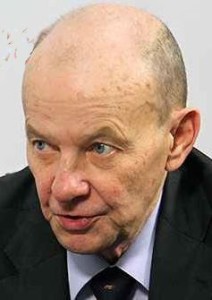
Cuba’s military machine seems to need updating. During a tour of the Cuban Army’s tank division on Friday (Feb. 13), Shoigu remarked on the fact that Cuban armorers have been improving their Soviet-built armored vehicles with homemade parts, much as Cuban mechanics keep U.S.-built antique cars running.
Earlier this week, the vice president of the Russian Academy of Geopolitical Problems, Vladimir Anokhin, wrote that Russia was entering “new frontiers of cooperation with Latin America” and that Shoigu’s tour “can be a very fitting response to the United States in its attempts to expand its influence in Europe.”
He called Shoigu’s trip a significant working visit, not a courtesy call, “a very smooth and gradual development of our influence in Latin America […] creating the conditions for our presence in the region.” [For more of Anokhin’s analysis, click here.]
Of the military experts interviewed by Tass, only one minimized the purpose of Shoigu’s tour. Lieut. Gen. Yevgeny Buzhinski, former head of the Defense Ministry’s International Treaty Directorate, called it “a routine working visit without any ‘gotchas.'”
“I believe that this is the usual routine trip as part of bilateral plans for international military cooperation,” he said. “Conspiracy theories are uncalled for.”
SHOIGU MEETS WITH RAUL CASTRO
At a meeting with Cuban President Raúl Castro on the afternoon of Friday (Feb. 13), Shoigu said that his “visit to Cuba should be considered in the context of the dynamically developing bilateral relations.”
“Our countries are bound by a common interest in forming a just and polycentric world order based on equality, adherence to international law and respect for it with the United Nations in the central role,” he said.
Shoigu thanked Castro for the warm welcome and hospitality extended to the Russian military delegation.
“I was glad to be back in Cuba,” he said, alluding to a visit in November 2009, when he was Minister of Emergency Situations. At the time, Cuba was reeling from the effects of two hurricanes and a tropical storm and Russia was sending assistance.
“Your country is our longtime friend, the symbol of freedom and independence in Latin America. By withstanding the effects of a blockade lasting more than half a century, Cuba firmly and consistently continues to protect its national sovereignty and implement its development model,” Shoigu said.
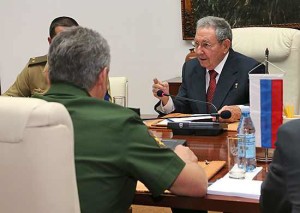
“The time-tested friendly relations between Russia and Cuba are gaining new momentum,” he said, adding that a powerful impetus to the strengthening of ties was the visit of President Vladimir Putin to Havana last July.
“The implementation of the agreements reached during the top-level meetings is our priority,” Shoigu said.
He noted that the long tradition of friendship between the people of Russia and Cuba “is a solid foundation for expanding bilateral cooperation and the coordination of efforts in the international arena.”
The defense minister invited military delegations from Cuba to participate in the Tank Biathlon, an international competition at Army Forum 2015, a conference on international security to be held in Russia later this year. Castro, Cuba’s former Defense Minister, accepted the invitation.
Shoigu also invited Cuban officers and servicemen to attend Russian military academies. “We see good prospects of cooperation in this area,” he said.
“Our military relations are developing constructively,” Shoigu summed up. “We are grateful to the Cuban side for the reception given to Russian military ships and other vessels when approaching the Port of Havana. We are interested in expanding cooperation in the naval field.”


